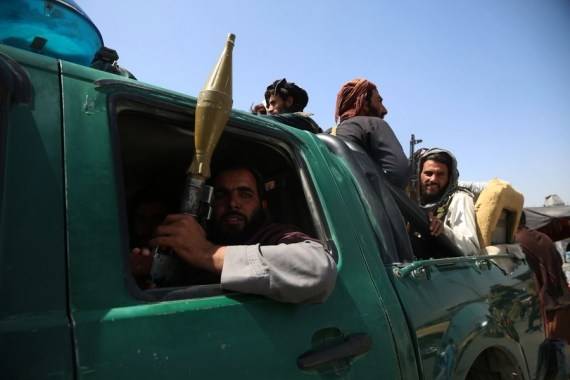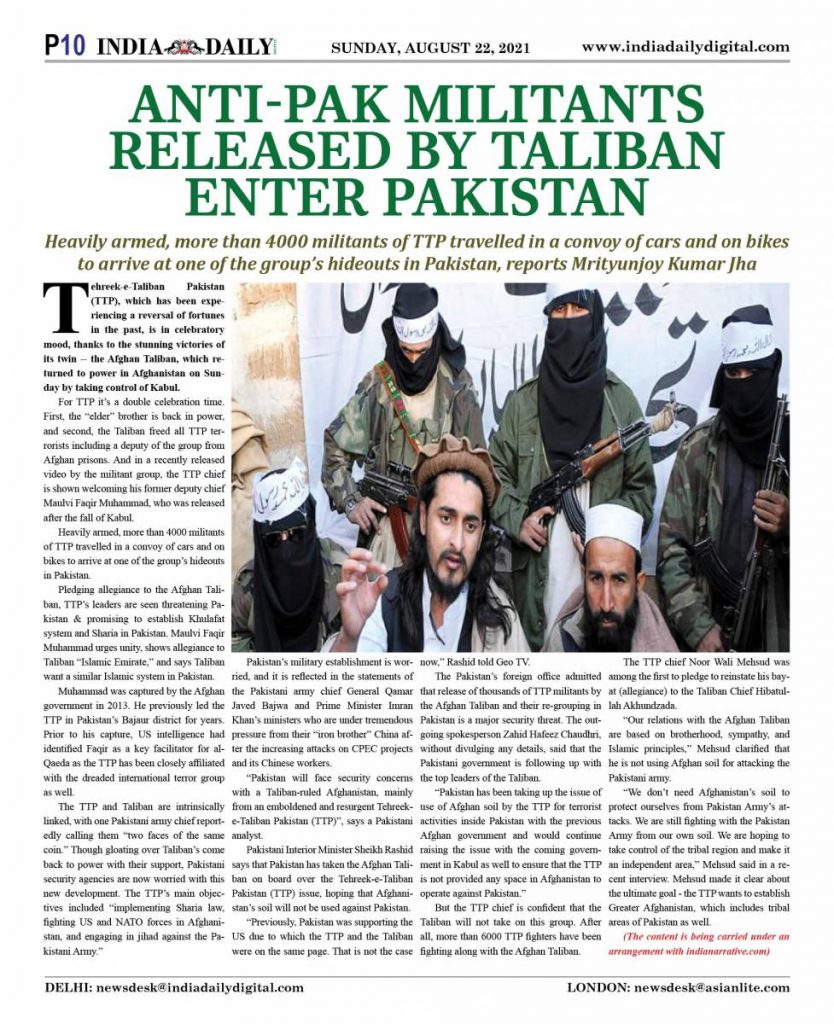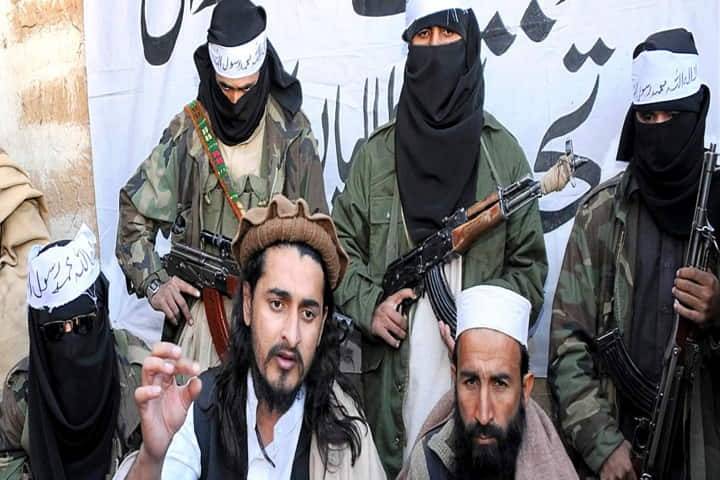Heavily armed, more than 4000 militants of TTP travelled in a convoy of cars and on bikes to arrive at one of the group’s hideouts in Pakistan, reports Mrityunjoy Kumar Jha
Tehreek-e-Taliban Pakistan (TTP), which has been experiencing a reversal of fortunes in the past, is in celebratory mood, thanks to the stunning victories of its twin — the Afghan Taliban, which returned to power in Afghanistan on Sunday by taking control of Kabul.
For TTP it’s a double celebration time. First, the “elder” brother is back in power, and second, the Taliban freed all TTP terrorists including a deputy of the group from Afghan prisons. And in a recently released video by the militant group, the TTP chief is shown welcoming his former deputy chief Maulvi Faqir Muhammad, who was released after the fall of Kabul.
Heavily armed, more than 4000 militants of TTP travelled in a convoy of cars and on bikes to arrive at one of the group’s hideouts in Pakistan.
Pledging allegiance to the Afghan Taliban, TTP’s leaders are seen threatening Pakistan & promising to establish Khulafat system and Sharia in Pakistan. Maulvi Faqir Muhammad urges unity, shows allegiance to Taliban “Islamic Emirate,” and says Taliban want a similar Islamic system in Pakistan.
Muhammad was captured by the Afghan government in 2013. He previously led the TTP in Pakistan’s Bajaur district for years. Prior to his capture, US intelligence had identified Faqir as a key facilitator for al-Qaeda as the TTP has been closely affiliated with the dreaded international terror group as well.

The TTP and Taliban are intrinsically linked, with one Pakistani army chief reportedly calling them “two faces of the same coin.”
Though gloating over Taliban’s come back to power with their support, Pakistani security agencies are now worried with this new development. The TTP’s main objectives included “implementing Sharia law, fighting US and NATO forces in Afghanistan, and engaging in jihad against the Pakistani Army.”
ALSO READ: Is sanctioning Pakistan need of hour?
Pakistan’s military establishment is worried, and it is reflected in the statements of the Pakistani army chief General Qamar Javed Bajwa and Prime Minister Imran Khan’s ministers who are under tremendous pressure from their “iron brother” China after the increasing attacks on CPEC projects and its Chinese workers.
“Pakistan will face security concerns with a Taliban-ruled Afghanistan, mainly from an emboldened and resurgent Tehreek-e-Taliban Pakistan (TTP)”, says a Pakistani analyst.
Pakistani Interior Minister Sheikh Rashid says that Pakistan has taken the Afghan Taliban on board over the Tehreek-e-Taliban Pakistan (TTP) issue, hoping that Afghanistan’s soil will not be used against Pakistan.

“Previously, Pakistan was supporting the US due to which the TTP and the Taliban were on the same page. That is not the case now,” Rashid told Geo TV.
The Pakistan’s foreign office admitted that release of thousands of TTP militants by the Afghan Taliban and their re-grouping in Pakistan is a major security threat. The outgoing spokesperson Zahid Hafeez Chaudhri, without divulging any details, said that the Pakistani government is following up with the top leaders of the Taliban.
“Pakistan has been taking up the issue of use of Afghan soil by the TTP for terrorist activities inside Pakistan with the previous Afghan government and would continue raising the issue with the coming government in Kabul as well to ensure that the TTP is not provided any space in Afghanistan to operate against Pakistan.”

But the TTP chief is confident that the Taliban will not take on this group. After all, more than 6000 TTP fighters have been fighting along with the Afghan Taliban.
The TTP chief Noor Wali Mehsud was among the first to pledge to reinstate his bayat (allegiance) to the Taliban Chief Hibatullah Akhundzada.
“Our relations with the Afghan Taliban are based on brotherhood, sympathy, and Islamic principles,” Mehsud clarified that he is not using Afghan soil for attacking the Pakistani army.
“We don’t need Afghanistan’s soil to protect ourselves from Pakistan Army’s attacks. We are still fighting with the Pakistan Army from our own soil. We are hoping to take control of the tribal region and make it an independent area,” Mehsud said in a recent interview. Mehsud made it clear about the ultimate goal – the TTP wants to establish Greater Afghanistan, which includes tribal areas of Pakistan as well.
(The content is being carried under an arrangement with indianarrative.com)

Leave a Reply